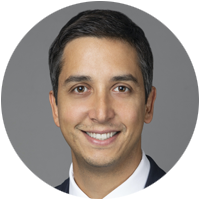José Nolazco, MD, MMSc | Master of Medical Sciences in Clinical Investigation

José Ignacio Nolazco, MD, MMSc, is a urologist, Fulbright scholar, and National Institutes of Health – All of Us Research Program scholar. He graduated from the Master of Medical Sciences in Clinical Investigation program at Harvard Medical School (HMS) in 2023. During that time, Nolazco served as director of policy and advocacy for the Harvard Medical School Master’s Student Council. He is a research fellow in urologic oncology at Brigham and Women’s Hospital and also serves as a member of the Networking Committee for the hospital’s Postdoctoral Leadership Council.
Furthering Education With a Hands-On Approach
José Ignacio Nolazco began his medical education in Argentina at Facultad de Ciencias Biomédicas, Universidad Austral. He completed his urology residency training at Hospital Italiano de Buenos Aires and advanced to serve as chief resident. After his residency, he deepened his specialization with a urology fellowship at Hospital Universitario Austral. In 2021, Nolazco received a Fulbright scholarship, recognizing his commitment to pursuing academic excellence.
This distinction enabled him to explore advanced studies in the United States, where he applied to four master’s programs, ultimately selecting the Master of Medical Sciences in Clinical Investigation at Harvard Medical School. He saw that the program offered the value of hands-on skills and mentored research experience that would allow him to work alongside accomplished urologists in the research field.
Enhancing Patient Care Through Research
While enrolled in the Master of Medical Sciences in Clinical Investigation program, Nolazco engaged in diverse research areas, including smoking cessation among cancer patients, enhancing patient quality of life, and studying oncological outcomes, particularly in kidney and prostate cancers. Under the guidance of his mentor, Steven Lee Chang, MD, MS, Nolazco chose to focus his master’s thesis on exploring smoking cessation in cancer survivors and its potential impact on improving patients’ quality of life.
“I find it incredible how a simple intervention can significantly impact our patients’ lives,” he says. “Typically, we focus on drug combinations to enhance the overall survival of cancer patients. Yet, a straightforward, cost-effective strategy like smoking cessation counseling can have a huge impact on patient outcomes.”
Nolazco stresses that this type of intervention not only enhances patients’ quality of life and overall survival but also improves their tolerance to oncological drugs and reduces the risk of disease progression and recurrence, among other benefits.
“Unfortunately, our results reveal a significant association between having a urological malignancy and the likelihood of continuing to smoke after diagnosis, compared to patients treated by other specialists,” he adds. “As urologists, we have a unique opportunity to make a significant difference with what appears to be a simple intervention.”
Building Relationships That Bolster Success
Throughout the program, Nolazco was immersed in the procedural steps involved from taking a research question through to publishing a paper. In addition to enhancing his skills in data analysis, interpretation, and effective communication of research findings, he developed invaluable relationships with his classmates and mentor.
“Whenever I reflect on the program, the first thing that pops into my head is the amazing mentorship from Dr. Steven Lee Chang. Honestly, he was the best mentor anyone could ask for. He was incredibly supportive and genuinely caring about my professional growth and success. Dr. Chang always made that extra effort to make sure I had everything I needed for my research,” he recalls.
Nolazco also is grateful for the incredible friendships he has made. Although his classmates came from diverse backgrounds, countries, and cultures, they shared the same dream of becoming skilled researchers. “That really brought us together, creating a unique sense of community,” he says. “Being part of this program with so many passionate, aspiring scientists from around the world was genuinely inspiring.”
He credits his time in the program with helping him to receive a National Institutes of Health scholarship. Currently, he is collaborating with a multidisciplinary team of researchers on prostate cancer to identify genetic variants associated with prostate cancer risk in African American populations.
“Once you open the door to this program, there are so many other doors that become open to you,” he adds. “The Master of Medical Sciences in Clinical Investigation program offers incredible opportunities and is truly transformative.”